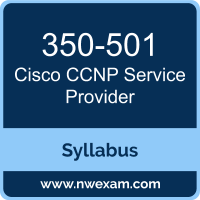 A great way to start the Cisco Certified Specialist Service Provider Core (SPCOR) preparation is to begin by properly appreciating the role that syllabus and study guide play in the Cisco 350-501 certification exam. This study guide is an instrument to get you on the same page with Cisco and understand the nature of the Cisco CCNP Service Provider exam.
A great way to start the Cisco Certified Specialist Service Provider Core (SPCOR) preparation is to begin by properly appreciating the role that syllabus and study guide play in the Cisco 350-501 certification exam. This study guide is an instrument to get you on the same page with Cisco and understand the nature of the Cisco CCNP Service Provider exam.
Our team of experts has composed this Cisco 350-501 exam preparation guide to provide the overview about Implementing and Operating Cisco Service Provider Network Core Technologies exam, study material, sample questions, practice exam and ways to interpret the exam objectives to help you assess your readiness for the Cisco SPCOR exam by identifying prerequisite areas of knowledge. We recommend you to refer the simulation questions and practice test listed in this guide to determine what type of questions will be asked and the level of difficulty that could be tested in the Cisco CCNP Service Provider certification exam.
Cisco 350-501 Exam Overview:
| Exam Name | Implementing and Operating Cisco Service Provider Network Core Technologies |
| Exam Number | 350-501 SPCOR |
| Exam Price | $400 USD |
| Duration | 120 minutes |
| Number of Questions | 90-110 |
| Passing Score | Variable (750-850 / 1000 Approx.) |
| Recommended Training |
Implementing and Operating Cisco Service Provider Network Core Technologies | SPCOR Implementing and Operating Cisco Service Provider Network Core Technologies 1.2 Implementing and Operating Cisco Service Provider Network Core Technologies (SPCOR) v1.2 |
| Exam Registration | PEARSON VUE |
| Sample Questions | Cisco 350-501 Sample Questions |
| Practice Exam | Cisco Certified Specialist Service Provider Core Practice Test |
Cisco 350-501 Exam Topics:
| Section | Weight | Objectives |
|---|---|---|
| Architecture | 15% |
- Describe service provider architectures
- Describe Cisco network software architecture
- Describe service provider virtualization
- Describe QoS architecture
- Configure and verify control plan security
- Describe management plane security
- Implement data plane security
|
| Networking | 30% |
- Implement IS-IS (IPv4 and IPv6)
- Implement OSPF (v2 and v3)
- Describe BGP path selection algorithm.
- Implement routing policy language and route maps (BGP, OSPF, IS-IS)
- Describe IPv6 transition (NAT44, NAT64, CGNAT, MAP-T and DS Lite)
|
| MPLS and Segment Routing | 20% |
- Implement MPLS
- Describe traffic engineering
- Describe segment routing
|
| Services | 20% |
- Describe VPN services
- Configure L2VPN and Carrier Ethernet
- Configure L3VPN
- Implement multicast services
- Implement QoS services
|
| Automation and Assurance | 15% |
- Describe the programmable APIs used to include Cisco devices in network automation - Interpret an external script to configure a Cisco device using a REST API - Describe the role of Network Services Orchestration (NSO) - Describe the high-level principles and benefits of a data modeling language, such as YANG - Describe configuration management tools, such as Ansible and Terraform - Describe Secure ZTP - Configure dial-in/out, TCP, TLS and mTLS certificates using gRPC and gNMI - Configure and verify NetFlow/IPFIX - Configure and verify NETCONF and RESTCONF - Configure and verify SNMP (v2c/v3) |
Cisco SPCOR Exam Description:
Implementing and Operating Cisco Service Provider Network Core Technologies v1.1 (SPCOR 350-501) is a 120-minute exam associated with the CCNP and CCIE Service Provider Certifications. This exam tests a candidate's knowledge of implementing core service provider network technologies including core architecture, services, networking, automation, quality of services, security, and network assurance. The course, Implementing and Operating Cisco Service Provider Network Core Technologies, helps candidates to prepare for this exam.
